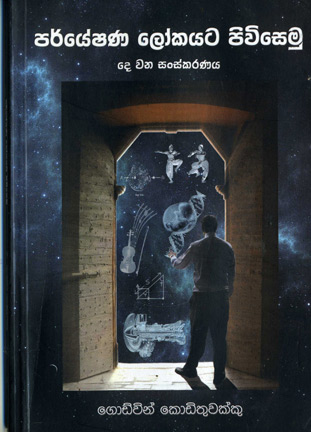All-encompassing book on research methods
‘Paryeshana Lokayata Pivisemu’
(Let us Enter Research World)
Author : Dr. Godwin Kodithuwakku
Published by The Institute for Research and Development Battaramulla
Reviewed by Anil Pagoda Arachchi
Admittedly, there seems to be a significant development in the field
of educational research done not only by higher educational institution
such as universities and the National Institute of Education but also by
professionals including teachers, lecturers and other officers.
One major difficulty the professionals continually encounter for this
is the dearth of textbooks on the pedagogical and practical aspects of
doing research in Sinhala language.
To make the problem worse, even the few available textbooks puzzle
the novices in the field, for they provide only theoretical aspects of
research genres with little attention being paid to explaining the
research process in a simple way.
 Dr. Godwin Kodithuwakku’s textbook on research Paryeshana Lokayata
Pivisemu can be considered a wonderful piece of work to fill this gap.
His style of writing, presentation of facts and the illustrations and
examples given can educate the beginner researchers on all the areas of
research, namely what research is, the main types of research, research
methodology and research process. Dr. Godwin Kodithuwakku’s textbook on research Paryeshana Lokayata
Pivisemu can be considered a wonderful piece of work to fill this gap.
His style of writing, presentation of facts and the illustrations and
examples given can educate the beginner researchers on all the areas of
research, namely what research is, the main types of research, research
methodology and research process.
The book will not bore the readers with sophisticated research jargon
generally found in research textbooks, and, instead, it will be
appealing to them because of its readability.
The first chapter deals with the strategies of raising questions, an
important skill of becoming a good researcher.
The materials present meaningful contexts for the reader to
comprehend the logic behind raising such questions. And the next four
chapters vividly delve on the epistemological and ontological paradigms
of which knowledge is essentially important for the researchers to have
an in-depth understanding of the characteristics of both quantitative
and qualitative research.
Deductive reasoning
The chapters on deductive and inductive reasoning that forms the
basis of the division of both paradigms have been written drawing in
examples from meaningful contexts that in turn enable the novice
researchers to grasp the fundamentals underlying the two types. However,
the writer does not make efforts to polarise the research genres into
the formally accepted traditional classification, yet he brings in
accounts of how all major types of research such as survey research,
case study research, ethnographical research and phenomenological
research are carried out with very suitable examples.
Acceptably, what really worries the beginning researchers is how to
locate and review research literature.
This is an extremely necessary area because it demonstrates the
underlying assumptions behind the general research questions,
demonstrates that the researcher is knowledgeable about related research
and intellectual traditions that surround the study and shows that the
researcher has identified some gaps in previous research.
Also, it is a literature review that helps the researcher to redefine
his research questions by embodying them in larger empirical traditions.
The information in the chapter on literature review will definitely
equip the readers with the appropriate methodology of doing such review
including the commonly used tools for it.
Concepts
Particular note must also be made about the way he uses illustrations
to explain the difficult concepts related to research namely, developing
hypotheses, classification of disciplines, development of knowledge,
dimensions of knowledge, two basic approaches to research, research
process and sampling methods.
His simple approach however does not make the reader overlook the
rigour of research process. Why his book must be taken as a milestone in
Sri Lankan context is because of the attempts he makes to give all
aspects of research to the reader with examples drawn from the day to
day life experiences.
What strikes me most is the last chapter titled ‘Art, song and
research’ that takes us into a hitherto unknown world of research.
This enlightens us on how to locate researchable areas in poetry,
novels dramas and films’ and how art can be very effectively used to
teach research methodology.
Dr. Kodithuwakku, an eminent practitioner of educational research,
seems to deviate from the traditional aspects of doing research by
introducing new vitas to research field yet without damaging to the
commonly evolved research traditions.
The book provides worthwhile information on doing research to novice
researchers.
However, it does not necessarely mean that this book aims at only
educational researchers but it will also be helpful for any professional
in many profession to acquire the basic knowledge of research. Though an
emphasis is placed on novice researchers here, even professional
researchers can benefit immensely from the book. |

